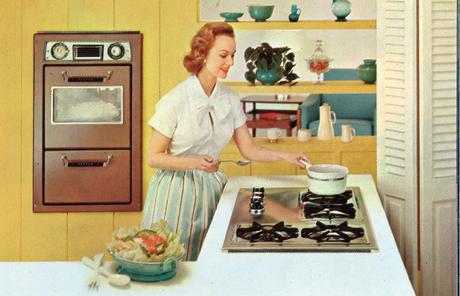
Is “housewife” a dirty word?
As the daughter of a full-time mom, the word “housewife” elicits mixed feelings. On the one hand, as a Latina feminist, I am aware of how our patriarchal society governs women’s roles and relegates them to traditional domesticity. On the other, though, I have watched my mother endure burns, scratches and arthritic pain to do the back-breaking work that supports her household — and can’t help but admire and appreciate her work ethic. I was offended and even a bit hurt, therefore, to learn that Dictionary.com defines “housewife” as a term that is “sometimes offensive.”
To be fair, this designation perhaps makes sense based on the relatively recent historical legacy established by the feminist movement of the 1960s and 1970s. Being a housewife was largely regarded by this movement as equitable to giving up one’s power and, in a sense, being coerced into doing domestic work. Feminist leaders — like Betty Friedan, author of the famous book, The Feminist Mystique — perpetuated this idea and proposed that women must reject domesticity by breaking professional barriers and claiming personal, sexual freedom. Rejecting the “housewife” role was part and parcel of this effort.
The current, negative connotation of the term “housewife,” therefore, is likely tied to this perception that domestic work was inherently oppressive. It’s true that for decades many women had no choice but to be housewives and it makes sense that being perpetually confined to one role would make anyone hate any occupation, no matter it’s nature. What’s more, many women at the time likely did hate being housewives and wanted something else from life.
But the idea that being a housewife is somehow less worthy of respect has carried on to our generation, despite the fact that many women do have other options now. Maintaining this belief therefore fails to take into account (and actively discredits) the women who genuinely enjoy housework. It also devalues all the work that does go into being a “housewife.” According to a 2014 survey by Salary.com, for example, the average stay-at-home mom would have made $188,905 in 2014 including 56.5 hours in overtime. Working moms, according to the same survey, would have made $70,107, excluding the money they earn from their jobs outside the home.
Clearly, being a housewife is not an easy job and deserves respect. Now that women have many opportunities available to them, being a housewife is often a choice rather than a role necessitated by coercion or a lack of other opportunities. An interest in domesticity shouldn’t make a woman any less feminist or necessarily less independent than those who work predominately outside of the home.
While some might say we should retire the stigmatized term, doing so would mean that there was something wrong with it in the first place. Modern feminism prides itself on respecting women’s choices, regardless of how much we disagree with them, and retiring the term would rob many women of being able to make the choice that is best for them and their families. Instead, women who choose this path should reclaim it — and we should all respect them for doing so.

